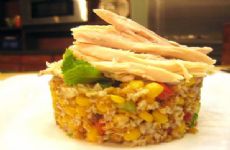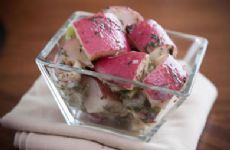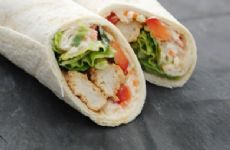|
These days, it’s hard to avoid all the buzzwords surrounding the latest diet trends. There are social media pages, websites, books, magazines and even clothing touting various messages about how or what to eat. "Clean eating" is one such term that's been thrown around for years. But what does ''clean eating'' actually mean, and how can you apply it in your own life? Let's break it down once and for all! What Is Clean Eating? To ''eat clean'' means to eat whole, largely unprocessed foods in order to minimize the amount of unnecessary or potentially harmful chemicals and additives one ingests. People who eat this way avoid foods processed or altered by manufacturers, and instead choose foods that are as close to their natural forms as possible. (''Processing'' includes additions of any kind, such as salt, sugar, fat and/or preservatives.) Studies have shown that clean eating can result in improved mood, more energy, better sleep, enhanced athletic performance, healthier skin and greater feelings of overall happiness. 12 Steps to Eating Cleaner Clean eating doesn’t have to be all or nothing—and it doesn’t have to be complicated. Below are the tenets of clean eating. Try to incorporate as many as you can, but don’t be discouraged if you can’t include them all. Just do your best with what you've got! 1) Avoid processed foods. Maybe you’ve heard the phrase ''shop the perimeter''—that means to shop around the perimeter of the grocery store where most of the produce, meats and refrigerated items are sold. Almost all processed foods can be found within the center aisles of the store. There are exceptions, of course, so be sure to read your food labels to be sure. (For example, packaged beans, legumes and whole grains like quinoa and brown rice are all clean foods.) In general, always try to choose foods that contain as few ingredients as possible. 2) Add more veggies and fruits to your diet. While you’re shopping the perimeter, be sure to pick up a variety of fruits and veggies. You’ll notice that as the seasons change, so do the fruits and vegetables. If you love blueberries but know you won’t see them year-round or that they’ll be prohibitively expensive in the winter, stock up in the summer and freeze them so you can enjoy them whenever you want. 3) Eat whole grains, not refined grains. Whole grains have not been stripped down or altered in any way. When you eat whole grains, you are eating fiber, plant-based proteins, vitamins, minerals and other good-for-you phytochemicals that are missing in refined, stripped-down grains such as white rice, pasta and breads. Good whole-grain options include quinoa, brown rice, whole wheat and oatmeal. 4) Choose healthy fats. Don't fear fat! When you choose the healthy fats, you're doing your heart, brain and other bodily systems a favor. Healthy fats can even help raise your good HDL cholesterol. Choose olive oil, fish, nuts and avocados for sources of good-for-you fats. 5) Eliminate refined sugar. That sounds like a tall order! But if you can significantly cut down on the amount of refined sugar in your diet, you will also be lowering your risk of weight gain, cancer and heart disease. Limit sweets like sodas, candy and baked goods. Read labels for added sugar in seemingly healthier foods such as flavored yogurt, cereals and sauces. 6) Combine protein with carbs. To feel fuller longer and to help you resist junk food temptations, combine a lean protein with a complex carb at meal or snack time. Combining these two foods maintains energy levels and decreases insulin spikes. Click here for food suggestions that fit the bill. 7) Eat less meat. Eating less meat and more grains, beans, fruits and veggies can really help you rack up the health benefits! You’ll be consuming fewer calories, less saturated fat and cholesterol and higher amounts of vitamins, minerals and fiber. You’ll also be less prone to cancer and will be at a lower risk for heart problems. If and when you do eat meat, choose lighter meats like chicken breast or lean cuts of pork. 8) Eat five or six small, clean meals a day. Eating small meals throughout the day will stabilize your blood sugar and increase your metabolism. Since you’ll be eating frequently all day, you’ll be less likely to look for a snack in the pantry or fridge every time you walk by. 9) Reduce alcohol intake. Alcohol offers only empty calories and no nutritional value. Save those sips of wine and beer for special occasions. 10) Monitor your salt intake. This one will be easier than you think, especially if you have cut back or eliminated your processed foods. Clean foods are naturally low in salt. Still, you should watch your table salt, keeping the sprinkles to a minimum. Experiment with flavor by adding other spices and herbs into your favorite meals. 11) Choose organic whenever possible. If your budget is tight, make dairy, eggs and the ''dirty dozen'' fruits and vegetables a priority whenever possible. 12) Cook your own meals. Cooking your own meals allows you to apply all the principles of clean eating. If you know what you’re adding to your meal, you know you aren’t adding processed ingredients. Experiment with different grains, veggies, lean meats and spices to keep your palate satisfied. You can also plan your meals and grocery lists ahead of time to make sure you stay on the right path to clean eating. Click here for food suggestions, or try one of these tasty recipes from Enjoy Life Foods. |
Related Entries
More From SparkPeople
|






















